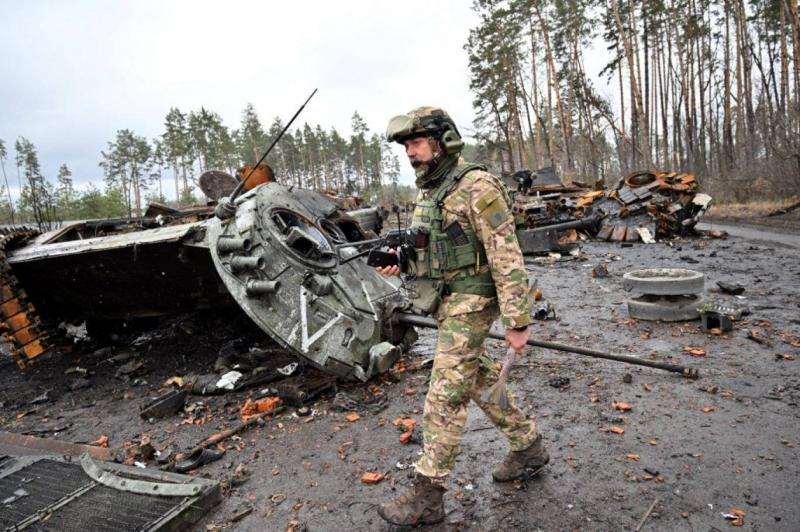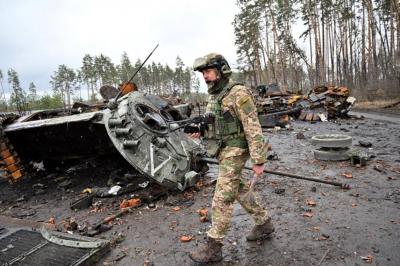Western fears are not specifically centered on Ukraine, but rather on Putin's increasing appetite for invading other countries from the former Eastern bloc, should he consolidate his power in Ukraine. If this happens, NATO would reluctantly have to engage in a nuclear war with Moscow.
Perhaps the main question that occupies everyone's mind now, after a full year of war, whether among specialists or others, is what the future holds for the Ukrainian war. It is known in political science that predictions are very difficult due to the constantly changing nature of politics and interests. Moreover, the data and intelligence that predominantly and suddenly shape the course of events are not available to everyone. A review of what transpired during the first year of the war, and building on it, may help in outlining fairly realistic scenarios for the conflict. Regardless of Putin's justifications for invading Ukraine, it was imagined—along with a significant segment of political and military specialists—that a swift victory could be achieved due to the vast military power gap between Russia (the second-largest military power in the world) and Ukraine. Furthermore, it was thought that Europe would remain silent due to its complete dependence on Russian gas. Finally, Putin held a firm belief that the United States and NATO would not respond militarily. However, the developments during the year entirely contradicted Putin's expectations. He was surprised by fierce military and popular Ukrainian resistance, supported by American military and logistical aid, and unprecedented European-American solidarity manifested in severe economic sanctions against Moscow, including an end to reliance on Russian oil and gas. In addition, he was also surprised by the discontent of his main allies, especially China, regarding the continuation of the war without a clear resolution from Moscow or a diplomatic end.
This led to increased obstinacy from Putin to secure victory, as evidenced by the declaration of partial mobilization and the call-up of nearly 300,000 reservist troops, as well as publicly threatening to use tactical nuclear weapons against Western forces supporting Kyiv, and suspending the "START" nuclear treaty between Washington and Moscow. On the other side, optimism among the West, particularly in Washington, grew regarding the ability of the Ukrainian army and resistance to defeat Russia, or at the very least, to inflict severe defeats on the Russian military while simultaneously facing the burden of sanctions. This could lead to forcing Putin to withdraw, or triggering strong public unrest against him to end the war, and possibly even a military coup against Putin, especially if he began to use nuclear weapons.
The fears of the West are not specifically centered on Ukraine, but rather on Putin's increasing appetite for conquering other countries from the former Eastern bloc, should he establish control in Ukraine. If this occurs, NATO would reluctantly be compelled to engage in a nuclear war with Moscow.
At the end of the first year of the war, three major events reflected the preceding situation in terms of Putin's fierce determination to achieve victory and Washington's great optimism regarding depleting Russia, alongside China's diligent efforts, reflecting clear dissatisfaction, to end the war. The first was Biden's visit to Ukraine, where he publicly stated in his speech there, after meeting with Zelensky, that Russia would never win this war, and announced military aid to Ukraine worth half a billion dollars, including advanced weapons. The second was President Putin's speech to the Union, which revolved around the legitimacy of this war and the necessity of continuing and succeeding in it, while claiming the West had failed militarily and economically to break Russia. The third was China’s proposal for a peace plan in Ukraine, which included terms for a ceasefire and the commencement of negotiations, non-use of nuclear weapons, and lifting Western sanctions on Moscow. Washington rejected the Chinese plan, skeptical of China's intentions and integrity, viewing it as entirely biased in favor of Moscow. According to American officials, the plan was seen as a way to provide Putin with more time to regain his diminished strength in Ukraine.
In light of the above, it can be concluded that it is unlikely that the pace of the war on Ukrainian territory will end in the very near future, at least not in 2023; rather, it will increase in violence. However, in the medium term, and likely by the second anniversary of the war, especially with China's involvement in the crisis, there may be some decrease in the pace of war coinciding with the start of serious negotiations to end the conflict.
It can be said that China, with its vast international weight and genuine influence over Moscow, is capable of playing a crucial role in ending the war. This is reflected in its peace plan, which offered a foundation upon which to build towards resolving the conflict. What can be extrapolated from the plan is a balanced settlement preserving Russia's face through adequate guarantees from the West concerning the complete removal of the notion of Ukraine joining NATO, and perhaps recognizing Russia's annexation of Crimea. In return, Russia would commit to maintaining Ukraine's independence and territorial integrity, not threatening other countries, as implicitly stated in the plan, and working to reduce the nuclear arms race in Europe.
There are clear prospects for China's overall success, and particularly for the plan in ending the war in the long term, due to the immense difficulty that Putin will face in decisively concluding the conflict. The West will not only continue to help Ukraine but also, the Ukrainians are courageously fighting a liberation war against what they perceive as oppressive invading forces. Perhaps Russian forces themselves are also unconvinced of the legitimacy of this war, fighting with a very lackluster spirit, as evidenced by the rapid collapse observed after they seized new territories in Ukraine.




